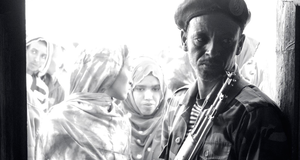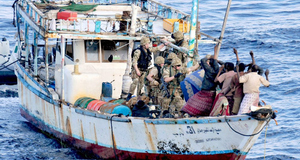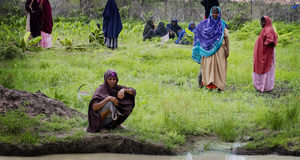From Interstate - Journal of International Affairs VOL. 1996/1997 NO. 2The Western Media and Africa: Issues of Information and Images
IN THIS ARTICLE
KEYWORDS
“CNN is the 16th member of the Security Council” – Boutros Ghali, 1995. As we approach the millennium, with the triumph of the United States over Russia, capitalism over socialism and the market over planning, the depiction of Africa through the centuries has not changed considerably. Africa has been portrayed as the dark continent in need of civilising, and its heathen peoples in need of enlightenment through enslavement and colonisation. Africa has been presented as a continent in the difficult throes of trying to become more like the societies of the Western Hemisphere. From the era of Africa’s enslavement and colonial rule, traders, missionaries, adventurers and explorers have all played a role in perpetuating and disseminating certain images of Africa. These images have on the whole been negative. With the formal independence of most African countries in the 1950s and ’60s, anthropologists and modernisation theorists helped to portray a view of the dark, exotic Africa as being “emergent Africa.” The 1970s saw an image of “dependant Africa,” advocated by the dependency theorists who used the concept and theory of dependence in analysing Latin America, to understand Africa’s underdevelopment. In the 1980s and ’90s Africa has not only been portrayed has dependent Africa but as “crisis and pitiable Africa.” Whilst from the 16th century to the 19th century, colonial administrators, missionaries and merchants were largely responsible for disseminating ideas about Africa, today this dissemination is carried out by various forms of print and electronic media: newspapers, television, radio and the Internet. Misinformation about Africa has become a growth industry in the West. A vocabulary of metaphors is used in describing Africa. For example, “black on black violence” is a euphemism the Western press used in writing about South Africa in the 1980s, yet British journalists do not report on “white on white violence” when reporting the conflict in Northern Ireland. Most Westerners have never visited Africa and may never visit the continent. Yet there is a particular image of Africa in the Western mind. When one is asked to think of Western images that come to mind when thinking of Africa, the overall mental images are of primeval irrationality, tribal anarchy, hunger/famine, civil war, managerial ineptitude, political instability, flagrant corruption and incompetent leadership. These mental images of Africa have their deep roots in a historical relationship of slavery and colonialism which was imposed on the continent. It was a relationship which defined Africa and Africans as culturally, intellectually, politically and technically backward and inferior. These ideas continue to permeate the perspectives Western journalists, editors and academics adopt when writing about Africa. More recently there has been open talk of recolonizing Africa. In an editorial entitled “Weep for the Lost Continent,” the Independent on Sunday claimed: “Africa is so much without hope that it is difficult to believe that it can help itself. If western countries had the will they could recolonise the continent which they left in such haste. The Japanese and the Germans could run Africa, using the British, as professional ex-colonists, as their official agents.”(1) In the Spectator, Paul Johnson’s went as far as to say: “What the third world needs is a new form of imperialism: altruistic, internationally supervised, efficient and tough-minded … the factors which will permit the revival of colonialism are in place.”(2) Patrick Marnham “wonders whether Africa can ever be governable” and claims that “in Africa no known system of government works,”(3) whilst Robert Kaplan warned US government officials of an impending anarchy of social disease, environmental decay, population explosion and civil war, commencing in Sierra Leone and embroiling the twenty-first century. Calling for the recolonization of Africa by the Western media and academic community is an alarming and highly dangerous trend. It is a view that is as nonsensical and it is patronising and racist. It is an analysis which seeks to blame the victims and deflect any focus on the role Europe has played in the bloody mess of Africa. These views are nothing but a modernised repackaging of the British colonial view of Africa and Africans as incapable of managing their own affairs. What all these views fail to take into account are the deep-rooted causes of the disintegration of the African state, which was undoubtedly exacerbated by the coming to power of an African elite which colluded with French, British, American governments and multinational companies to bleed African economies through Western imposed neo-liberal economic reforms. Certainly, Africa has ruthless and corrupt Moi’s, Mobutu’s, Bokassa’s, but these leaders have been propped up (and in Mobutu’s case, installed) by Western governments. This is never given adequate coverage by the Western media. Western news reporting in general is often portrayed as being neutral and impartial, and the journalist as a neutral and balanced arbiter. There is still a popular misconception that anything written or seen on television is true. This is often a huge myth which needs to be exploded. Firstly, “information” does not exist in an ideological vacuum. Information on Africa is often presented without a historical and analytical context to explain the roots of a conflict. On account of this lack of historical and analytical examination, most Western reports resort to attributing all conflicts in Africa to primordial irrationality and “tribalism” Secondly, “information” of reporting on Africa sometimes underlies or informs Western governments’ foreign policies. How television images of starving Somalis in 1991-2 led to the US government’s military intervention will be examined later as a prime example of how the media can and do have a direct influence on government policy. Thirdly, “information” also plays a big role in the formation of Western public opinion, both sympathetic and negative, towards Africa and African people. The image of “Africa needing help,” was the dominant image during the 1984 Ethiopian famine and Band Aid was an international response motivated by Western public sympathy. Fourthly “information” is not neutral. The mass media is not neutral in the news it chooses to disseminate on Africa. Imperialist and racist attitudes are often reflected in the angle and more often than not, the language it employs. I shall now examine how the Western media covered the conflicts in Somalia from 1991-1993 and Rwanda from 1994 to 1995. I have selected these two countries because they are highly interesting in themselves and show the interplay between three sets of Western institutions: the news media, governments and humanitarian organisations. These two conflicts also provide some concrete examples of the gross misrepresentations of issues and images of Africans. In looking at Rwanda and Somalia as case studies, we have to ask four important questions. Firstly, how did the Western media portray these two conflicts? Secondly, what were the real issues that were concealed in the media’s misrepresentations? Thirdly, what kind of language was used to represent the issues? Finally, how did the media attention link with Western governments’ policymaking and Western humanitarian responses?Continued on Next Page » Suggested Reading from Inquiries Journal
Inquiries Journal provides undergraduate and graduate students around the world a platform for the wide dissemination of academic work over a range of core disciplines. Representing the work of students from hundreds of institutions around the globe, Inquiries Journal's large database of academic articles is completely free. Learn more | Blog | Submit Latest in International Affairs |

















